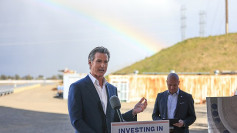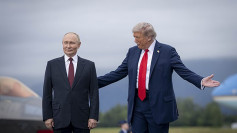Former President Barack Obama's recent remarks aimed at rallying support for Vice President Kamala Harris have sparked backlash among swing state voters, potentially complicating the Democratic ticket's efforts as the 2024 election looms. Obama's comments, delivered at a campaign event in Pittsburgh, Pennsylvania, were intended to address disparities in Harris' support levels among Black men. However, the response, according to a social media analysis by monitoring firm Impact Social, has been largely negative, with many deeming his statements disrespectful and patronizing.
Obama's appearance came as part of a broader Democratic strategy to bolster Harris' appeal in critical swing states. Speaking to a predominantly Black audience of Harris supporters, Obama noted the lack of enthusiasm for the vice president among some Black voters compared to the energy he saw during his own campaigns. He suggested that reluctance to back Harris may stem, in part, from sexism, stating, "It seems to be more pronounced with the brothers." The former president's intention was to mobilize a demographic seen as vital for Democratic success; however, the reaction online has been mixed.
According to Impact Social's analysis conducted from October 10-14, the sentiment around Obama's remarks was predominantly negative. Of the 12,000 posts analyzed, only 17% expressed positive views of the former president's comments, while 33% were negative. The firm's analysis, based on data from a user database of 40,000 swing state voters, revealed that many saw Obama's remarks as disrespectful. Some critics likened his statements to Joe Biden's controversial "you ain't Black" comment during the 2020 election.
In the negative responses, Impact Social categorized 38% of posts as backlash against Obama's speech. Another 27% criticized Obama directly, while 12% took aim at his broader record. Some of the backlash was even more pointed, with one online post accusing him of "disrespecting Black men" and suggesting that such remarks could undermine Harris' candidacy. "Obama calling out Black men will sink Kamala's ship," one user wrote, underscoring the risk his words may pose to Harris' campaign.
While there was a strong negative reaction, there were also voices defending Obama's comments. Some argued that his unique position as a Black former president gave him the authority to speak candidly about issues within the Black community. "Whenever Obama tells uncomfortable truths, it never ceases to amaze me how folks are more upset about him pointing out the truths than the problems themselves," read one supportive post.
The former president's comments aimed to address discrepancies in Harris' support base, particularly as recent polls highlight gaps in her approval among Black male voters. The NAACP's recent survey showed Harris lagging in support compared to the enthusiasm Biden enjoyed in 2020. These findings prompted the Democrats to enlist Obama, hoping his influence could energize Black voters ahead of the election. Yet, the reaction suggests that his approach may not have resonated as intended.
The National Association for the Advancement of Colored People (NAACP) also responded to the controversy. Dominik Whitehead, Senior Vice President of Campaigns and Mobilization for the organization, emphasized that Black men are a reliable voting bloc and downplayed suggestions that they would not show up in 2024. "Next to Black women, Black men are the second most reliable voting bloc in the country. We will vote," Whitehead told Newsweek. However, he also noted that Harris needs to offer substantive policy solutions to secure this demographic's support, stating that Black men want to see "real policy solutions that address the issues top-of-mind for us, our families, and our community."
The Impact Social analysis further revealed that the negative sentiment around Obama's remarks could have broader implications for the Democratic campaign strategy. Independent voters in swing states, who are critical for determining election outcomes, were found to view Obama's comments as reminiscent of Biden's controversial remark in 2020. The analysis noted that many independents felt Obama's statements were "racist and disrespectful," potentially weakening support for Harris among these key voters.
Obama's comments also drew parallels with previous election cycles, where Democrats have faced challenges in maintaining enthusiasm among male voters. The backlash, largely fueled by online discussions and media commentary, underscores the sensitivity surrounding Democratic outreach efforts within diverse communities. Media critics and conservative pundits have seized on Obama's speech as an example of Democrats failing to connect with a critical part of their base, further amplifying the controversy.
However, some commentators have argued that the backlash is misplaced. They assert that Obama's rhetoric was consistent with his past efforts to mobilize voters by addressing uncomfortable truths. Defenders of Obama's message point out that his comments mirror outreach efforts directed at other ethnic communities, where men are encouraged to reject misogyny and hypermasculinity in their voting behavior. Supporters also argue that Obama's remarks were not about singling out Black men but about challenging harmful attitudes that transcend racial lines.
Despite the mixed reactions, Obama's role in the Harris campaign underscores the broader Democratic strategy as the party seeks to shore up support in key demographics ahead of the 2024 election. The controversy surrounding his comments highlights the tightrope Democrats must walk in balancing honest conversations about voter behavior while ensuring they do not alienate potential supporters.






